Major Foreign Policy Challenges Facing the Next Administration
Anne-Marie Slaughter, Princeton University
Photos | Transcript
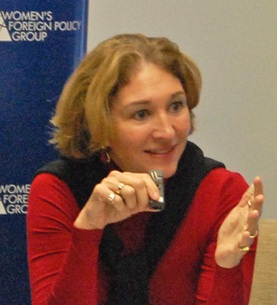 Washington, DC—On November 1, 2012, Anne-Marie Slaughter addressed WFPG on the foreign policy challenges and priorities for a second-term Obama administration, as well as some of the challenges that could emerge in the future.
Washington, DC—On November 1, 2012, Anne-Marie Slaughter addressed WFPG on the foreign policy challenges and priorities for a second-term Obama administration, as well as some of the challenges that could emerge in the future.
Slaughter highlighted climate change and immigration—two hold-over issues from the previous term—as key items on President Obama’s agenda. She believes climate change became a much higher priority in the wake of Super Storm Sandy and the President’s failure to pass a cap-and-trade bill during his first term.
On the Middle East, Slaughter held that President Obama considered Middle East peace and actual end-stage peace negotiations a priority for his next term. According to Slaughter, a new special envoy to the region might help progress toward peace. Slaughter also believes President Obama will attempt to transform the American relationship with the Muslim world, and that the growing importance and size of the youth population gives the United States an “unbelievable opportunity” to redefine the US role in the region with an entirely new generation. In addition, Slaughter emphasized the need for a much greater reliance on government-to-society and society-to-society initiatives, rather than government-to-government programs, to resolve regional issues.
Nuclear disarmament is another issue the President would like to address in his next term, and is supported by prominent former officials such as Henry Kissinger, George Schultz, Bill Perry, and Sam Nunn. Slaughter believes that the President will attempt to lock the US and Russia into further cuts, and also begin pressuring other nuclear states, especially under the looming threat of Iranian nuclear weapons capacity.
While the President will have his own foreign policy priorities, he will also have to "confront the inbox" and address challenges in the near-term, including security concerns in Afghanistan and Pakistan relating to the 2014 troop withdrawal. Slaughter believes that the President will adhere to the 2014 withdrawal timeframe, but she is skeptical of a complete removal of US forces from the region.
Slaughter also anticipates that the administration will face a number of global economic challenges with the US's most important trade partners. First and foremost, the President will have to respond to the sovereign debt crisis in Europe, which has a number of long-term consequences, particularly its impact on slowing the Chinese economy. Slaughter likewise sees economic turmoil in Japan as an emerging challenge, primarily because of the US reliance on Japanese collaboration in its Asia strategy.
Slaughter also discussed emerging powers, such as Indonesia and Turkey, as areas in which the President will face challenges, but more importantly as areas in which the United States has an opportunity to lead. According to Slaughter, the emergence of Brazil as an additional major player will have both political and economic implications for Obama's foreign policy strategy. She highlighted the fact that there will most likely be leadership transitions in Cuba and Venezuela in the near future, which will compel Brazil to choose how to position itself politically. She also suggests that Brazil will become a much more important partner for the US as the Caribbean emerges as a source of energy and economic investment.
 |
 |
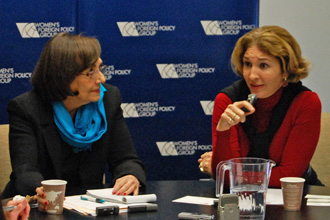 |
WFPG President Patricia Ellis and
speaker Anne-Marie Slaughter
|
|
Patricia Ellis with Anne-Marie Slaughter
|
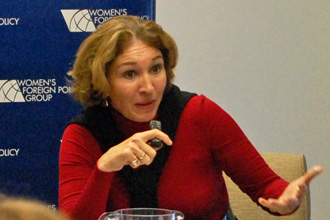 |
 |
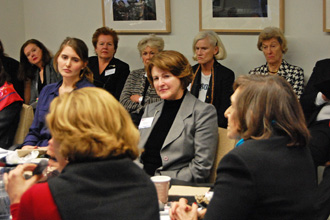 |
Anne-Marie Slaughter addresses WFPG
|
|
WFPG Board Member Theresa Loar and program
participants listen to the program
|
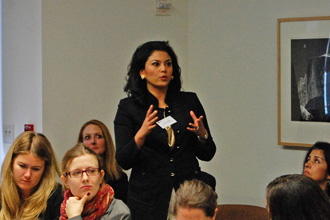 |
 |
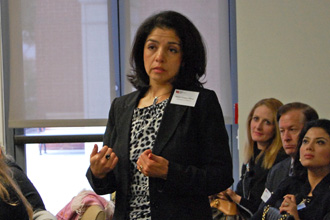 |
Dr. Rosa Djalal of the Embassy of
Indonesia asks a question
|
|
Mabel Gomez-Oliver, Deputy Chief of Mission of
Mexico, participates in the Q&A
|
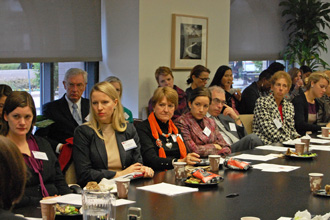 |
 |
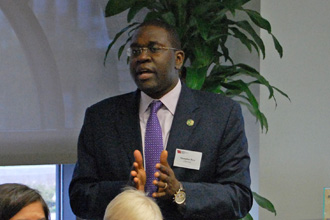 |
| |
|
|
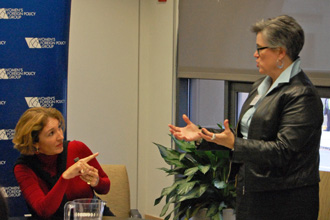 |
 |
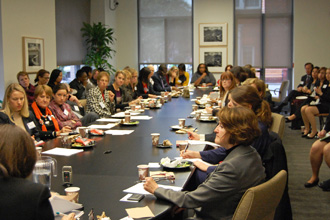 |
| |
|
|
| |
|
|